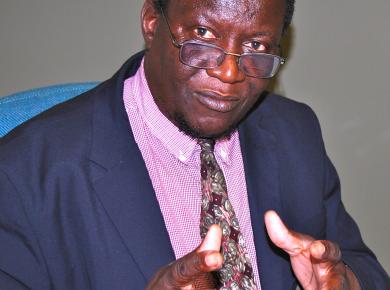Posted: January 1, 2004
The move of Mennonite World Conference toward being an expression of koinonia is a noble one. To make it happen, however, we need mutual sharing of resources and mutual accountability.
As a global community, we value fellowship. Members bound together by the love of Christ experience fellowship in its fullness. Such communities, according to Paul in Ephesians 4:1-6, lead lives worthy of their calling. They are “completely humble, gently … patient bearing with one another in love.” They are mindful of the fact that “there is one body … one Spirit … one hope … one Lord, one faith, one baptism; one God and Father of all.” This spiritual union and fellowship make MWC a communion.
The leadership of MWC, in the context of such a community, strives to create an environment that makes its membership – more than one million believers in 53 countries – feel interconnected. This interconnectedness or koinonia calls for participation in each other’s joys and heartaches. When MWC member bodies give to one another the necessary and relevant support in times of need, there is koinonia.
MWC leadership should play a pivotal role in encouraging member bodies to share without apology what they perceive as their spiritual needs. MWC is rich in human resources: people with gifts, talents, and skills in evangelism and church planting, teaching, and discipleship who only need inspiration and motivation to rise to the challenge.
In our day, despite technological advancements, we seem overwhelmed by the poor, the needy, the widows, and the orphans. Our world is constantly bombarded by disasters. The HIV/AIDS pandemic has left communities devastated, particularly in central and southern Africa. As a global community of faith, we are to be sensitive to such heartbreaking situations around us.
The spirit of koinonia requires us to bear each other’s burdens (Galatians 6:2). In Zimbabwe, for example, the health delivery system is near collapse. Medical supplies are in short supply and, where available, are too expensive for the majority of our people. Health professionals are de-motivated, and some have left the country. The ripple effects of such situations coupled with insufficient food supplies can be devastating.
In situations such as these, MWC must make its presence known through member bodies who meet people’s social needs and concerns. In other words, such member bodies must not only lift up their banner but also that of MWC.
As MWC, we must make available space for our member bodies to compare notes with each other so that all can improve their ways of operating. Also, as individual groups serve on behalf of MWC, they are then worthy of every MWC member’s financial and material support.
Koinonia within the MWC family can also be enhanced by taking a stand against all forms of unrighteousness and injustice. Silence in the face of unrighteousness and injustice committed by institutions and organizations as well as by individuals makes us collaborators of evil deeds. We are “to consider how we may spur one another on toward love and good deeds” (Hebrews10:24). If we indeed are a community / communion, there should always be room to rebuke and correct one another. There should be willingness to tell one another the truth with love and join together to condemn all forms of unrighteousness and injustice.
It is my hope that MWC will live up to the expectation of our grounding in koinonia. We will do this as we participate in meeting each other’s spiritual and social needs. We will also express koinonia by identifying with and being a voice for the oppressed.
Danisa Ndlovu, Bulawayo, Zimbabwe, was elected vice-president of MWC by the General Council last August. He serves as bishop of the Brethren in Christ Church of Zimbabwe.
This article was published in Courier 2004, Volume 19, Number 1

Join the Conversation on Social Media
FacebookTwitterInstagramFlickrYouTube